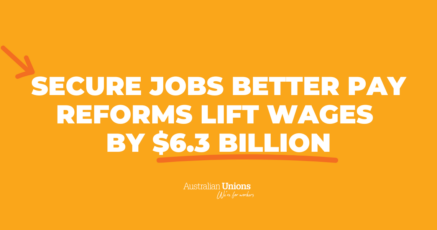In a period of record low wage growth, one of the most successful strategies among workers to increase their incomes − asking for a pay rise – is also one of the least used, according to a new survey by industry super fund-owned bank, ME.
Only 12% of the 1,000 workers across the country surveyed in the ‘ME Show Me the Money!’ survey said they had asked for a pay rise, with this figure dropping to 8% among women, but of those who deployed this strategy, almost 75% enjoyed success.
According to the survey an overwhelming 90% of working people said they would like to be earning more, with the most common motivation to pay for the cost of living (25% reported this motivation), while the most common motivation among Gen Z (aged 18-24) and Millennials (aged 25-39) was paying for a house (45% and 31% respectively).
Over half of those surveyed said the state of the economy was limiting their ability to increase their earnings.
Invest in yourself today for higher returns tomorrow
ME Money Expert, Matthew Read, said: “ME commissioned the survey because investing in yourself and your career can have a positive impact on your net worth over time”.
“Only 36% of Australians understand their income is their most important financial asset, so the more we encourage people to focus on increasing their earning potential, the better.
“Having a long-term plan to increase your earning potential and actively working on that plan can help you realise your financial goals like being able to buy a home.”
Why we’re not demanding ‘show me the money!’
Career Management Group, Managing Director and Career Strategist, Marjolein Bervoets, said one reason Australian workers aren’t asking for pay rises is a lack of negotiating power.
“Asking for a pay rise is not as simple as it sounds. It requires a strategic approach, an understanding of the link between productivity and remuneration and being able to articulate the value you add.
“I wasn’t surprised by ME’s findings, in particular how fewer than 10% of working Aussies had researched their current net worth, tested the job market, listed down their key achievements or mapped out a career plan – these are all important actions workers can use to strengthen their negotiating power and increase their own employability. Too often, employees rely on their employer to take responsibility for their career instead of investing in themselves.”
The most popular strategy for increasing earning potential, according to the ‘ME Show Me the Money!’ survey, was to ‘work as hard as possible’, although this was a less successful approach with close to half stating it increased their income.
Proven income boosting strategies with good returns
|
Income boosting strategy |
% success |
% who currently deploy |
|
Built my own business |
77% |
12% |
|
Asked for a pay rise |
70% |
12% |
|
Changed jobs |
70% |
19% |
|
Built a strong professional/career network |
70% |
16% |
|
Acted in a role or took up secondment opportunities |
68% |
12% |
|
Mapped out a career plan – goals, steps, timeframes |
64% |
8% |
|
Worked as hard as possible in my current job |
57% |
40% |
|
Wrote down my achievements and created a business-focused resume |
56% |
8% |
|
Researched my market value |
56% |
9% |
|
Worked as a volunteer to gain further experience or expertise |
55% |
7% |
|
Increased my level of education |
54% |
25% |
|
Tested myself in the job market by applying for jobs and attending interviews |
50% |
10% |
|
Obtained career advice |
50% |
6% |
|
Followed the job market |
42% |
12% |
It’s not all about the money – job satisfaction is important too
According to ME’s survey, around 60% of working Aussies said money and job satisfaction were equally important as their working life.
“So it’s worth acknowledging that not everyone wants to increase their income – it’s not the be all and end all. Some would rather focus on job satisfaction,” said Read.
The ‘ME Show Me the Money!’ survey was completed by a nationally representative sample of 1,000 workers from across the country in September 2017.





SHARE:
Requesting a pay rise actually works, but few ask